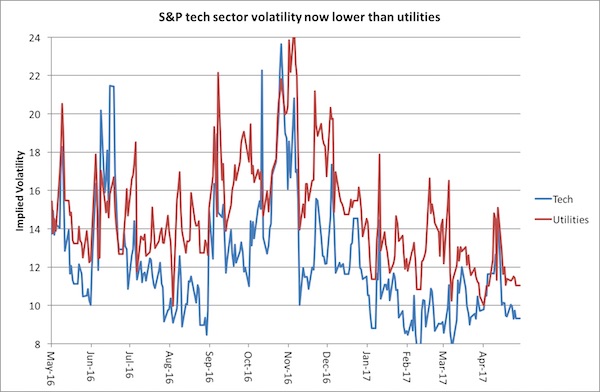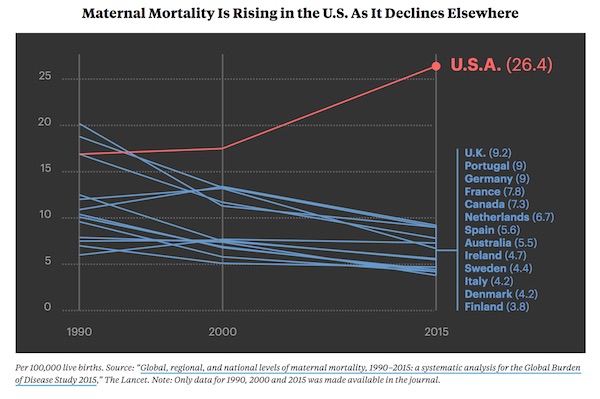
Walter Kelleher 13th Macy’s Thanksgiving Day Parade NYC 1937

Canada, Australia, New Zealand; and Sweden, Denmark and Norway.
• Canada’s Household Debt Levels Higher Than Any Other Country (CNBC)
Household debt levels in Canada are higher than in any other country, according to a report by the Organization for Economic Cooperation and Development (OECD). In a preliminary version of the report, set to be released fully next month, the OECD found Canada’s household debt ranked as the highest among the 35 developed and developing countries the group monitors. The rapid accumulation of household debt for Canadians could also leave its economy particularly vulnerable to shocks, the organization said. “Although in part this reflects strong population growth, these developments may entail significant risk to financial stability given the direct exposure of the financial system to the housing market,” the OECD said. The group found Canada’s household debt-to-GDP ratio had ballooned to 101% — significantly higher than any other nation studied.
In comparison, the ratio for South Korea was the next highest at slightly under 93%, with the U.K. third at over 88%. In the U.S., the household debt-to-GDP ratio was around 80%, while Germany and France had a ratio below 60%. “Research points to a number of links between high indebtedness and the risks of severe recessions,” the group said. While virtually all countries witnessed soaring debt loads ahead of the credit crisis a decade ago, most have seen their indebtedness reduce over time. However, for Canada — and some countries in Scandinavia — this has not been the case, with OECD pinning the blame on inflated house prices. “OECD countries that have experienced the strongest increases in household debt since the crisis have also the steepest rise in house prices,” the group said.
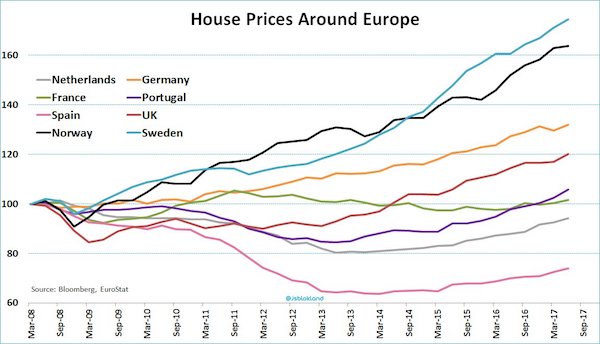

Highest since the Great Depression.
• As America Gives Thanks, Homelessness Sets New Records (Snyder)
If the U.S. economy was actually in good shape, we would expect that the number of people that are homeless would be going down or at least stabilizing. Instead, we have a growing national crisis on our hands. In fact, within the past two years “at least 10 cities or municipal regions in California, Oregon and Washington” have declared a state of emergency because the number of homeless is growing so rapidly. Things are particularly bad in southern California, and this year the Midnight Mission will literally be feeding a small army of people that have nowhere to sleep at night… “Thanksgiving meals will be served to thousands of homeless and near-homeless individuals today on Skid Row and in Pasadena and Canoga Park amid calls for donations and volunteers for the rest of the year. The Midnight Mission will serve Thanksgiving brunch to nearly 2,500 homeless and near-homeless men, women and children, according to Georgia Berkovich, its director of public affairs.”
Overall, the Midnight Mission serves more than a million meals a year, and Berkovich says that homelessness hasn’t been this bad in southern California “since the Great Depression”… “Berkovich said the group has been serving nearly 1 million meals a year each year since 2013. “We haven’t seen numbers like this since the Great Depression,” she said.” And of course the official numbers confirm what Berkovich is claiming. According to an article published earlier this year, the number of homeless people living in Los Angeles County has never been higher…”The number of homeless people in Los Angeles has jumped to a new record, as city officials grapple with a humanitarian crisis of proportions remarkable for a modern American metropolis. Municipal leaders said that a recent count over several nights found 55,188 homeless people living in a survey region comprising most of Los Angeles County, up more than 25% from last year.”
If the California economy is truly doing well, then why is this happening? We see the same thing happening when we look at the east coast. Just check out these numbers from New York City… “In recent years the number of homeless people has grown. Whereas rents increased by 18% between 2005 and 2015, incomes rose by 5%. When Rudy Giuliani entered City Hall in 1994, 24,000 people lived in shelters. About 31,000 lived in them when Mike Bloomberg became mayor in 2002. When Bill de Blasio entered City Hall in 2014, 51,500 did. The number of homeless people now in shelters is around 63,000. For New York, this is the highest that the homeless population has been since the Great Depression, and city leaders are trying to come up with a solution.”

It’s getting to be time for Hoovervilles.
• UK Council Proposes £1,000 Fines For Homeless People Sleeping In Tents (G.)
A council has been called “cruel and callous” for proposing £1,000 fines to homeless people sleeping in tents in the city centre. Stoke-on-Trent council in Staffordshire is consulting on a public space protection order (PSPO) that will make it an offence for a person to “assemble, erect, occupy or use” a tent unless part of a council-sanctioned activity such as a music festival. Under such a scheme anyone who fails to pay their £100 on-the-spot penalty notice can be prosecuted and could be fined up to £1,000 in court. Though only currently at the consultation stage, the PSPO would cover the city centre, Hanley park, Festival park and Octagon retail park.
Ruth Smeeth, the Labour MP for Stoke-on-Trent North and Kidsgrove, said: “This is a cruel and callous policy to inflict on our most vulnerable in the lead-up to Christmas. We do have a growing problem with homelessness here in Stoke-on-Trent, but punishing people for their misfortune is no way to fix it. “It’s right and proper that the police take action to stop antisocial behaviour on our streets, but punishing the homeless simply for being homeless is appalling. “In recent years we’ve seen local funding for drug and alcohol treatment slashed and support to tackle homelessness cut to the bone. Locking these people up or saddling them with debt they can’t pay will only make the problem worse.”

Incompetence.
• UK Faces Longest Fall in Living Standards on Record (BBG)
Britons were warned they are on course for the longest fall in living standards since records began 60 years ago after the U.K.’s fiscal watchdog took the ax to its outlook for economic growth. In an analysis of the government’s latest budget and accompanying report by the Office for Budget Responsibility, the Resolution Foundation said on Thursday that the economy is set to be 42 billion pounds ($56 billion) smaller in 2022 than the OBR predicted in March. It also calculated wages will not return to their pre-financial crisis levels of 2007 until at least 2025 once inflation is taken into account. Average annual pay is now projected to be 1,030 pounds lower in 2022 than the March forecasts and household disposable incomes will fall for an unprecedented 19 straight quarters between 2015 and 2020, according to Resolution.
The analysis was reinforced by the Institute for Fiscal Studies, which said the OBR’s forecasts implied average earnings would be almost 1,400 pounds lower in 2021 than predicted before the 2016 Brexit referendum and still below their 2008 level. “We are in danger of losing not just one but getting on for two decades of earnings growth,” IFS Director Paul Johnson told a briefing in London on Thursday. The warnings underscore the challenge Chancellor of the Exchequer Philip Hammond faced on Wednesday when he released a budget that left him little room for fiscal maneuver as Brexit looms. The OBR slashed its growth forecasts as a result of weak productivity, and Hammond piled further pressure on the budget by pledging extra cash for the health service and abolishing the tax on some housing purchases for first-time buyers.
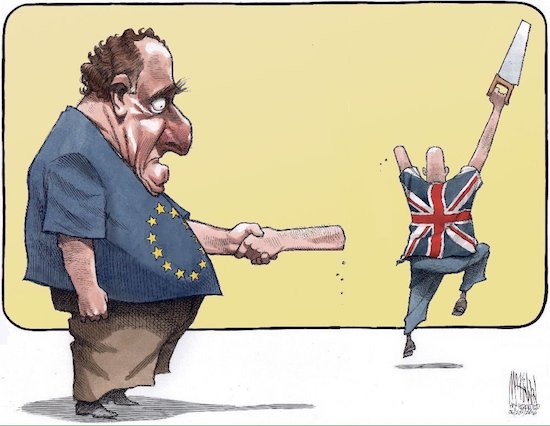

Tusk pretends to speak with a powerful mandate, but…
• Britain Has 10-Day Absolute Deadline On Key Brexit Issues: Tusk (R.)
Britain has only 10 days left to deliver on all three areas of its divorce terms with the European Union if London wants to start talks on a transition period after Brexit and a future relationship, the chairman of EU leaders Donald Tusk said. “We need to see progress from UK within 10 days on all issues, including on Ireland,” Tusk tweeted on Friday after a meeting with British Prime Minister Theresa May in Brussels. “Sufficient progress in Brexit talks at December council is possible but still a huge challenge,” he said on Twitter. An EU official said that May agreed in the one-hour discussions that Dec. 4 was the “absolute deadline” to allow the EU’s Brexit negotiator Michel Barnier to recommend moving onto the next stage on trade and future ties.
“Tusk presented the timeline ahead of the December European Council, with Dec. 4 as the absolute deadline for the UK to make additional efforts, allowing Barnier to be in a position to recommend sufficient progress,” the official said. “May agreed to this timeframe,” the official said. The official said Tusk had warned that if there was no progress within next 10 days, that would make moving forward impossible. The official said that the way Ireland’s border with Northern Ireland functioned after Britain leaves the EU in March 2019 was still an issue.

… that mandate has severely weakened now Germany’s in trouble…
• Germany’s Voice Suddenly Missing in Brussels (Spiegel)
European Union Budget Commissioner Günther Oettinger wanted to know what is going on in Germany. To find out, he set up a number of meetings in Berlin this week, including one in the Chancellery. He also arranged to chat with Christian Lindner, the head of the Free Democrats (FDP) and the man who unexpectedly turned his back on German coalition talks in Berlin last Sunday night. The reason for Oettinger’s interest in the political developments in Germany is simple. He has been assigned with writing a draft EU budget for the next 10 years and his due date is next May. He is currently traveling from capital to capital on the Continent to determine how member states envision EU spending for the period from 2018 to 2027.
But the German voice, which generally carries significant weight when it comes to budgetary questions,is silent these days. “The long process of assembling a government is weakening Germany’s influence in Brussels,” says Oettinger. “German influence on important issues is currently undiscernible.” The failure of German coalition negotiations in Berlin has caught the European Union completely off guard. Ahead of elections in France and the Netherlands earlier this year, there had been widespread concern about the rise of the right wing and potential difficulties when it came to assembling a governing coalition in those countries. Few such concerns were voiced ahead of Germany’s general election on Sept. 24. Everyone assumed that Germany was solid.
Now, though, French President Emmanuel Macron has taken center stage in the EU with his ambitious reform proposals while European Council President Donald Tusk has already come up with a detailed timeline for transforming Macron’s vision into concrete policy decisions. And suddenly, Germany has vanished. “You’re ruining our entire presidency,” complained Kaja Tael, Estonia’s permanent representative in Brussels. Estonia currently holds the EU’s rotating presidency.

Still surprised by these things?
• Tesla’s Newest Promises Break the Laws of Batteries (BBG)
Elon Musk knows how to make promises. Even by his own standards, the promises made last week while introducing two new Tesla vehicles—the heavy-duty Semi Truck and the speedy Roadster—are monuments of envelope pushing. To deliver, according to close observers of battery technology, Tesla would have to far exceed what is currently thought possible. Take the Tesla Semi: Musk vowed it would haul an unprecedented 80,000 pounds for 500 miles on a single charge, then recharge 400 miles of range in 30 minutes. That would require, based on Bloomberg estimates, a charging system that’s 10 times more powerful than one of the fastest battery-charging networks on the road today—Tesla’s own Superchargers.
The diminutive Tesla Roadster is promised to be the quickest production car ever built. But that achievement would mean squeezing into its tiny frame a battery twice as powerful as the largest battery currently available in an electric car. These claims are so far beyond current industry standards for electric vehicles that they would require either advances in battery technology or a new understanding of how batteries are put to use, said Sam Jaffe, battery analyst for Cairn Energy Research in Boulder, Colorado. In some cases, experts suspect Tesla might be banking on technological improvements between now and the time when new vehicles are actually ready for delivery.

“There is some kind of revolution coming to American life.”
• The Old Songs (Jim Kunstler)
It probably all comes down to money. Money represents the mojo to keep on keeping on, and there is probably nothing more unreal in American life these days than the way we measure our money — literally, what it’s worth, and what everything related to it is worth. So there is nothing more unreal in our national life than the idea that it’s possible to keep on keeping on as we do. The weeks ahead may be most illuminating on this score. The debt ceiling suspension runs out on December 8, around the same time that the tax reform question will resolve one way or another. The debt ceiling means that the treasury can’t issue any more bonds, bills, or notes. That is, it can’t borrow any more money to pretend the government can keep running.
[..] There’s a fair chance that congress may not be able to resolve the debt ceiling deadline. The votes may just not be there. If the deadline comes and goes, the treasury can only use incoming tax revenues to cover its costs, and it won’t be enough. It will have to choose whether it issues paychecks to the roughly 2.7 million US government employees, or pays the vendors that sell things like warplanes to the military, or pay out so-called entitlements like Medicare and SNAP cards, or pay the interest on the previously-issued bonds, debts, and bills that the US has racked up over the years. Believe it or not, making those interest payments is probably the top priority, because failing to do that would shove the nation officially into default for the first time and destroy the country’s credit standing. The full faith and credit in the US dollar would shatter.
And then the fun and games would really cease. The country would discover it doesn’t have its mojo working, as another old song goes. The reality of being truly broke will set in. After all, there are two basic ways of going broke as a nation: you can run out of money; or you can have plenty of money that is worthless. Take your pick. There is some kind of revolution coming to American life. One way or another, it amounts to a much lower standard of living. The journey there may take the public by surprise, a la Ernest Hemingway’s crack about how a character in one of his stories went broke: slowly, and then all at once. The main question about this journey must be whether it is accompanied by political violence. One would have to think the potential for that is pretty high, given levels of animosity and delusional thinking among the two opposing factions — can we even call them Left and Right anymore? — which may even exceed the ill-feeling of 1861.

Amen.
• Let’s Adopt The U.S. Naval Policy of 1890 (Rossini)
Back in 1890, the U.S. Naval Policy Board said in a report: “We fear no encroachments on our territory, nor are we tempted at present to encroach on that of others. We have no colonies, nor any desire to acquire them.” First, let’s discuss the aspect of the statement that has not changed one iota since 1890: “We fear no encroachments on our territory”. In 2017, we can say the exact same statement with total confidence. No state on the planet has any interest in conquering America. No one is interested in ruling over our WalMart/McDonald’s society. No one is interested in taking over Washington D.C. and inheriting 20,000,000,000,000 in debt. No one is interested in ruling a nation of people who are in debt up to their eyeballs with student loans, auto loans, mortgage loans, credit card loans….loans…loans…loans…loans…loans… No one is interested!
Which leads to the part of the statement that has changed since 1890: “..nor are we tempted at present to encroach on that of others.” In 1898, that aspect changed, and the U.S. federal government has never looked back. In 1898, the U.S. got its first taste of the conquering game. It swiftly took control of the Philippines, Guam, Puerto Rico, Cuba, and Hawaii. All of a sudden 11 million people were under a new American Empire. A few decades later, after the first high wore off, one of the worst decisions in the history of the world was made: U.S. President Woodrow Wilson tricked the American public into entering an exhausted and stalemated European war between princes. The “war to end all wars” was the war that would lead to the death of hundreds of millions over the next century.
The rest, of course, is history, and here we are: Broke….A country with middle-class that is disappearing, and 50% of the American public receiving some kind of welfare from a bankrupt government. U.S. Naval Policy in 1890 is where it’s at. The sooner we adopt it, the better.
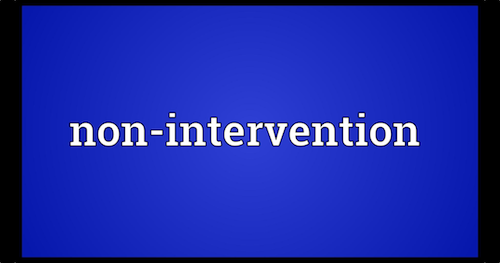

History repeats AND rhymes.
• The US-Saudi Starvation Blockade (Buchanan)
Our aim is to “starve the whole population – men, women, and children, old and young, wounded and sound – into submission,” said First Lord of the Admiralty Winston Churchill. He was speaking of Germany at the outset of the Great War of 1914-1918. Americans denounced as inhumane this starvation blockade that would eventually take the lives of a million German civilians. Yet when we went to war in 1917, a U.S. admiral told British Prime Minister Lloyd George, “You will find that it will take us only two months to become as great criminals as you are.” After the Armistice of Nov. 11, 1918, however, the starvation blockade was not lifted until Germany capitulated to all Allied demands in the Treaty of Versailles.
As late as March 1919, four months after the Germans laid down their arms, Churchill arose in Parliament to exult, “We are enforcing the blockade with rigor, and Germany is very near starvation.” So grave were conditions in Germany that Gen. Sir Herbert Plumer protested to Lloyd George in Paris that morale among his troops on the Rhine was sinking from seeing “hordes of skinny and bloated children pawing over the offal from British cantonments.” The starvation blockade was a war crime and a crime against humanity. But the horrors of the Second World War made people forget this milestone on the Western road to barbarism. A comparable crime is being committed today against the poorest people in the Arab world – and with the complicity of the United States.
[..] Almost 90% of Yemen’s food, fuel and medicine is imported, and these imports are being cut off. The largest cities under Houthi control, the port of Hodaida and Sanaa, the capital, have lost access to drinking water because the fuel needed to purify the water is not there. Thousands have died of cholera. Hundreds of thousands are at risk. Children are in danger from a diphtheria epidemic. Critical drugs and medicines have stopped coming in, a death sentence for diabetics and cancer patients. If airfields and ports under Houthi control are not allowed to open and the necessities of life and humanitarian aid are not allowed to flow in, the Yemenis face famine and starvation. What did these people do to deserve this? What did they do to us that we would assist the Saudis in doing this to them?
The Houthis are not al-Qaida or ISIS. Those are Sunni terrorist groups, and the Houthis detest them. Is this now the American way of war? Are we Americans, this Thanksgiving and Christmas, prepared to collude in a human rights catastrophe that will engender a hatred of us among generations of Yemeni and stain the name of our country?

We can’t afford Yemen, and we can’t afford Libya. We need to stop these medieval situations.
• Horrified By Libya Slave Trade, Rwanda Offers Refuge To Migrants (IBT)
Rwanda has opened its doors to migrants stuck in Libya and announced plans to take in as many as 30,000 people. The offer of help comes in response to an exposé into Libya’s underbelly where slave trade is flourishing. It involves migrants from other parts of Africa who are stuck in the country as they wait for an opportunity to cross into Europe. The government is still ironing out the details regarding how it plans to move interested parties from the northern part of the continent to the east. “Rwanda is currently under discussions… to see how we can help in welcoming migrants held captive in Libya,” Rwanda’s Foreign Minister Louise Mushikiwabo told AFP. “It has just been decided, so numbers and means are still under discussion, but Rwanda estimates the number to be welcomed around 30,000,” she said.
“For Africans being sold in Libya: Rwanda is small, but we will find some space!” she tweeted. In its investigation into the slave market in Libya, CNN was able to capture footage of auctions held in the capital city of Tripoli, where bids were accepted for men to be used for manual labour. While the videos only featured males, they have raised concerns over a similar fate for women and children who escaped their countries to come to Libya. “Rwanda, like the rest of the world, was horrified by the images of the tragedy currently unfolding in Libya, where African men, women and children who were on the road to exile, have been held and turned into slaves,” Mushikiwabo continued. “Given Rwanda’s political philosophy and our own history, we cannot remain silent when human beings are being mistreated and auctioned off like cattle,” she said. The minister was referring to her nation’s own dark history wherein over 800,000 people (mostly Tutsi) were killed in 1994 in one of the worst genocides in world history.

You see, Angela, the power you crave comes with responsibilities.
• Mediterranean ‘By Far World’s Deadliest Border’ For Migrants – IOM (R.)
More than 33,000 migrants have died at sea trying to reach European shores this century, making the Mediterranean “by far the world’s deadliest border”, the United Nations migration agency said on Friday. After record arrivals from 2014 to 2016, the European Union’s deal with Turkey to stop arrivals from Greece, and robust patrols off Libya’s coast have greatly reduced the flow, the International Organization for Migration (IOM) said. Professor Philippe Fargues of the European University Institute in Florence, author of the report, said the figures probably underestimated the actual scale of the human tragedy. “The report states that at least 33,761 migrants were reported to have died or gone missing in the Mediterranean between the year 2000 to 2017. This number is as of June 30,” IOM’s Jorge Galindo told a Geneva news briefing.
“It concludes that Europe’s Mediterranean border is by far the world’s deadliest,” he said. So far this year some 161,000 migrants and refugees have arrived in Europe by sea, about 75% of them landing in Italy with the rest in Greece, Cyprus and Spain, according to IOM figures. Nearly 3,000 others are dead or missing, it said. “Shutting the shorter and less dangerous routes can open longer and more dangerous routes, thus increasing the likelihood of dying at sea,” Fargues said. The report said: “Cooperation with Turkey to stem irregular flows is now being replicated with Libya, the main country of departure of migrants smuggled along the central route; however, such an approach is not only morally reprehensible but likely to be unsuccessful, given the context of extremely poor governance, instability and political fragmentation in Libya.”

Brussels and Athens have run out of excuses.
• The Refugee Scandal on the Island of Lesbos (Spiegel)
Those wishing to visit ground zero of European ignominy must simply drive up an olive tree-covered hill on the island of Lesbos until the high cement walls of Camp Moria come into view. “Welcome to prison,” someone has spray-painted on the walls. The dreadful stench of urine and garbage greets visitors and the ground is covered with hundreds of plastic bags. It is raining, and filthy water has collected ankle-deep on the road. The migrants who come out of the camp are covered with thin plastic capes and many of them are wearing only flipflops on their feet as they walk through the soup. Children are crying as men jostle their way through the crowd. Welcome to one of the most shameful sites in all of Europe. Camp Moria was originally built to handle 2,330 refugees. But currently it is home to 6,489.
[..] Conditions on the island of Lesbos haverarely been as precarious as they are today. Just as winter is arriving in Greece, some 15,000 refugees find themselves trapped in the five “hotspots” located on Greek islands in the Aegean Sea. Fully 8,357 of them are on Lesbos, living in horrific conditions in overcrowded, completely inadequate shelters. A huge number of refugees are forced to sleep in tents designed for summer conditions and many of them fear for their safety because of the close quarters and the repeated clashes in the main camp. Dozens of refugees have begun a hunger strike on Lesbos. The European Union’s refugee deal with Turkey may have managed to cut the number of people reaching Greece by 97%, but dozens of migrants continue to arrive every day.
Thus far this year, around 11,000 people have crossed over to the island from Turkey – a tiny number compared to the 12,500 who arrived on a single day in August 2015. But back then, newcomers were taken to the mainland and allowed to continue their journeys through the Balkans toward Hungary, Austria and, ultimately, Germany. Now, though, the former registration facilities have essentially been transformed into prisons. [..] he government in Athens has had plenty of time to learn its lesson from last winter, when five refugees died in Camp Moria, some of them because they were trying to heat their tents. Now, the country’s immigration minister is seeking to solve the problem at the last minute ahead of this winter by renting hotels on Lesbos and bringing in two ships from Piraeus that can accommodate a total of 3,000 refugees.
On the island of Lesbos though, where residents have shown remarkable patience thus far, there is widespread opposition to the plan. On Monday, the mayor of Lesbos, known for being a moderate, called for a general strike and declared war on the Greek government. He accuses Athens of seeking to use the need to establish winter facilities as an excuse to transform Lesbos into a prison island.

Let’s finish on a lighter note.
• Endangered Butterfly, Mexican Shrub May Be Hurdles to Trump Wall (BBG)
Environmentalists suing to block President Donald Trump from constructing a wall along the Mexican border say the project would imperil endangered species including the Quino checkerspot butterfly and the Mexican flannel bush. The Homeland Security Department has asserted authority under federal immigration law to waive compliance with environmental protection statutes because 14 miles of existing fencing near San Diego is “no longer optimal for border patrol operations.”
Defenders of Wildlife, the Animal Legal Defense Fund, the Sierra Club and the Center for Biological Diversity argued in court filings this week that the Trump administration’s attempts to sidestep the National Environmental Policy Act and the Endangered Species Act are unconstitutional. A hearing over the dispute is set for February before U.S. District Judge Gonzalo Curiel, whom Trump scorned during the presidential campaign over the San Diego jurist’s handling of the Trump University fraud litigation. Trump attacked Curiel as being biased against him because of his Mexican heritage, saying the Indiana-born judge had issued rulings against him as retribution for his pledge to build a wall between the U.S. and its neighbor to the south.



